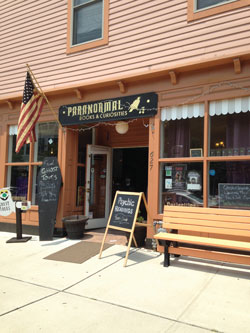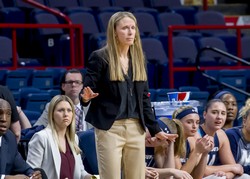History and Anthropology Lecturer Brooke Nappi is teaching a class this fall titled, “Magic, Witchcraft, and Religion” which infroms students of the religious and supernatural practices found in modern society.
According to the course description, the class explores the motivation of human behavior within the realm of religion and the supernatural emphasizing the role of gods and goddesses. The class uses a cross-cultural approach to explore cultures across the globe from both the past and the present.
Nappi began teaching the class in 2007, when it was called “Gods, Goddesses, and the Supernatural.” When she took over the class from a previous faculty member, she renamed it to its current name.
Nappi said, “I decided to change the title because Magic, Witchcraft, and Religion more accurately reflects how the discipline of anthropology has focused on this subject area at the college level, and because this title also more accurately reflects my personal interests in the anthropology of religion.”
The course explores a variety of cultures, and focuses on the anthropological perspective of religious cultural practices. The topics of the course include myth and symbolism, ritual, religious specialists, ghosts and the dead, and even supernatural topics like vampires and zombies. The course also explores the theoretical and practiced aspects of witchcraft and magic around the world, such as sorcery and superstition
Junior political science major Nicole Benis, said her favorite topic of the course is shamanic healing through the altered states of consciousness. Benis said, “We learned about these medicinal healers who would do surgeries on people while they themselves were in an altered state of consciousness. It was so interesting and weird to me at the same time,” Benis said.
Nappi’s favorite assignment is a modern day witch-hunt. Students pick a contemporary group, person, or phenomenon that could be a victim of a witch-hunt today. Examples include red-heads and even Miley Cyrus. Students apply anthropological methods and theories to better understand how mechanisms like moral panic and mass hysteria that caused the historic European and America witch-hunts are still around today.
The lessons do not always stay in the classroom, however. With Halloween right around the corner, Nappi will bring her class on a field trip to Asbury Park to get a historic ghost tour from the owner of Paranormal Books and Curiosities, Kathy Kelly. Kelly provides students with ghost stories, legends, and tales that happened right in Asbury Park. “This is a really fun way to get students to apply some of the ideas we’ve discussed in class to a fun and spooky activity,” said Nappi.
She hopes that the students of her class will walk away from her class understanding that the religious and supernatural practices deemed strange by dominant American society are actually not as strange as society has taught them.
Ritual practices like Santeria and Voodoo have been reinterpreted as something fantastical in Hollywood, while World religions like Catholicism and Judaism are seen as normal and legitimate.
Nappi said, “In this course students discover that the expression of belief may be vastly diverse, but the social and psychological functions that religious practice provides for its anthropological methods and theories to better understand how mechanisms like moral panic and mass hysteria that caused the historic European and America witch-hunts are still around today.
The lessons do not always stay in the classroom, however. With Halloween right around the corner, Nappi will bring her class on a field trip to Asbury Park to get a historic ghost tour from the owner of Paranormal Books and Curiosities, Kathy Kelly.
Kelly provides students with ghost stories, legends, and tales that happened right in Asbury Park. “This is a really fun way to get students to apply some of the ideas we’ve discussed in class to a fun and spooky activity,” said Nappi.
She hopes that the students of her class will walk away understanding that the religious and supernatural practices deemed strange by dominant American society are actually not as strange as society has taught them.
RNappi said, “In this course students discover that the expression of belief may be vastly diverse, but the social and psychological functions that religious practice provides for its subscribers is quite similar.”
Senior Anthropology and History major, Taylor Cavanaugh, took the class because it embodies different cultural aspects of magic, religion, and witchcraft. She said, “A lot of people think that it just means witches with the pointy hats and brooms, but it’s actually really a cultural thing, and different spiritual aspects that a lot of people in the United States aren’t as familiar with.”
Magic is an example of practice that many humans participate in all over the world, without even realizing it. “Many students come in to the course claiming to not be influenced by anything that isn’t proven science, and most do not engage in regular or devout religious practice.” Nappi pointed out that many of the students do actually engage in behavior or have beliefs that cannot be scientifically proven.
She gave the example of sporting rituals athletes participate in, such as using good luck charms, or eating certain foods that bring good luck. Nappi said, “Once we begin to look at ideas and theories about why all humans, regardless of the kind of culture they live in, incorporate beliefs and practices around times of stress and misfortune, then students start to realize that there is an important functional purpose in ritual practice that is common to all people, not just superstitious or ‘primitive’ people.”
Cavanaugh agrees that underneath it all, humans share certain aspects of culture. She said, “What they stress in every anthropology class, especially cultural anthropology, is culture relativity. It is just really important to get all the different world views, which obviously you can get from study abroad, but a good way is also a class like magic, religion, and witchcraft.”
IMAGE TAKEN from http://mysteriousheartland.com/



